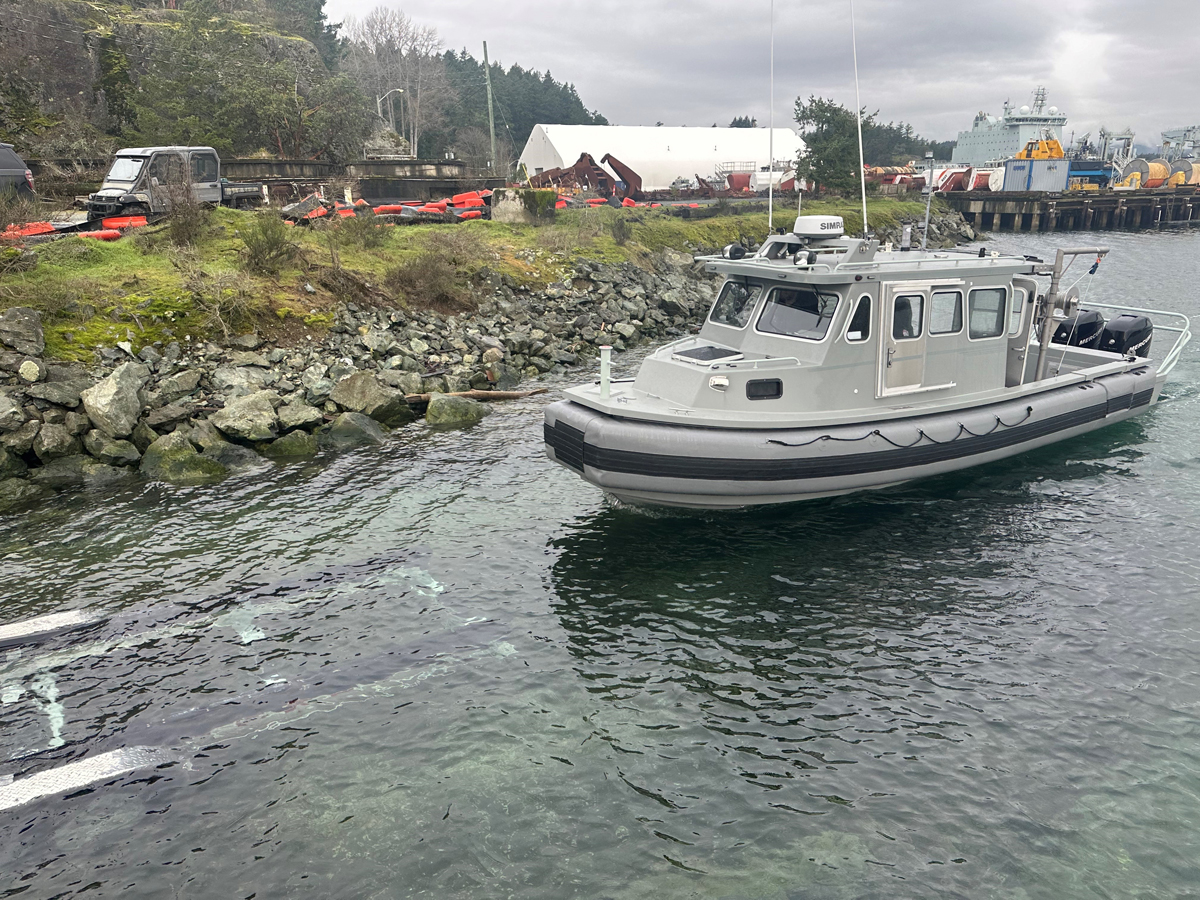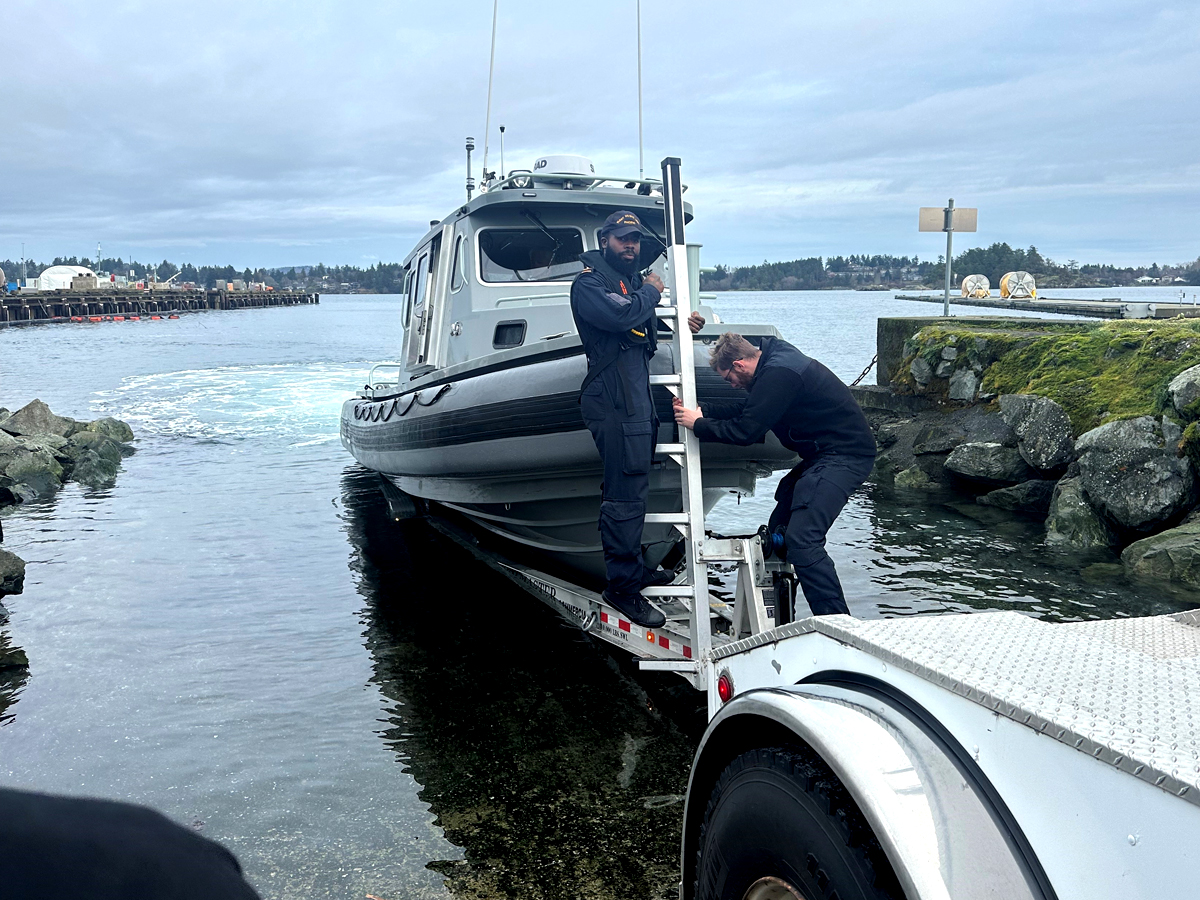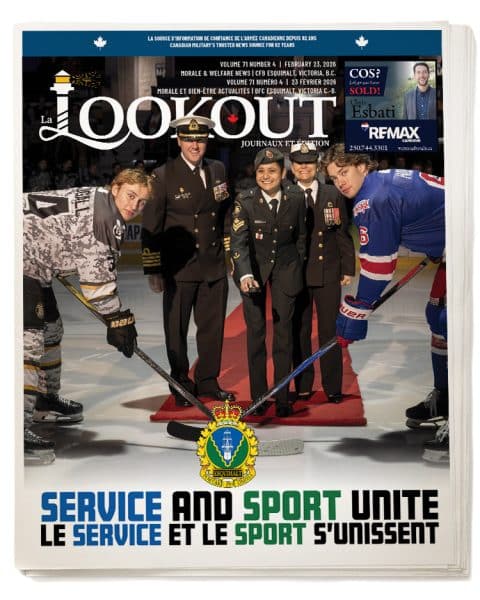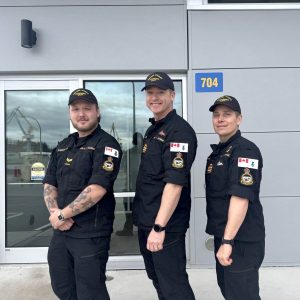
One of four Outboard Engine Diver Boats of Fleet Diving Unit (Pacific) located at the D Jetty. Photo: FDU(P)
Kate Bandura,
Lookout Editor
—
Fleet Diving Unit (Pacific) is making the most of its new vessels.
The Unit has been expecting four Outboard Engine Diver Boats (OEDB) since November; the boats replaced their existing Rigid Hull Inflatable Boats (RHIB).
Petty Officer 1st Class (PO1) Benoît Léonard, Operational Dive Team Chief, says the maneuverability of the OEDBs is vastly superior to the RHIBs.
“The cab and seats are great for the operators. It also keeps divers protected from elements during dive jobs and gives them a place to warm up,” he says.
The ‘outboard’ part indicates the engine is not ‘in’ the boat – this increases maneuverability and ease of maintenance, and allows for more deck space to work.
Master Sailor (MS) Joshua Hardy, the Tech/Dive Tender Engineer, says the twin, supercharged 275HP is, by far, the best part.
“Having an outboard mounted on the stern of the boat allows for better control and ease of operations. Being able to 1-for-1 swap an outboard in Unit, should the need arise, is definitely a benefit,” he said.
The twin O/B engines allow turning in tight spaces, and the power allows a fully loaded OEDB to come to speed much faster than the RHIB. Recovering divers using the diver doors fitted on the work deck is easy, and it allows for a quick transfer of equipment and helps in emergency situations. The OEDB is also quieter than the RHIB, which helps pass orders and instructions while ensuring divers do not spend hours in noisy environments.
Although the design hinders the ability to take many people out on the water, the OEDBs are far more comfortable and can go further out than RHIBs. PO1 Léonard says the boats are great for longer dive days.
“They have a great navigation suite which helps navigating to remote dive sites or end-of-day calls. It also has a nice open work deck allowing a functional dive site, and the amenities are great for poor weather,” he said.
Nine members were qualified to operate the vessels. Qualification required members to take a week-long course followed by one-on-one time with the instructor to ensure safe operation. Members were surprised by the little power required to maneuver the vessel, especially in reverse.
“I expected more PowerPoint,” MS Hardy said. “It was a nice surprise to spend enough time getting comfortable with the boat’s operations.”
The remaining RHIBs will be decommissioned and returned to stores to be auctioned off.
The Unit has been expecting four Outboard Engine Diver Boats (OEDB) since November; the boats replaced their existing Rigid Hull Inflatable Boats (RHIB).
Petty Officer 1st Class (PO1) Benoît Léonard, Operational Dive Team Chief, says the maneuverability of the OEDBs is vastly superior to the RHIBs.
“The cab and seats are great for the operators. It also keeps divers protected from elements during dive jobs and gives them a place to warm up,” he says.
The ‘outboard’ part indicates the engine is not ‘in’ the boat – this increases maneuverability and ease of maintenance, and allows for more deck space to work.
Master Sailor (MS) Joshua Hardy, the Tech/Dive Tender Engineer, says the twin, supercharged 275HP is, by far, the best part.
“Having an outboard mounted on the stern of the boat allows for better control and ease of operations. Being able to 1-for-1 swap an outboard in Unit, should the need arise, is definitely a benefit,” he said.
The twin O/B engines allow turning in tight spaces, and the power allows a fully loaded OEDB to come to speed much faster than the RHIB. Recovering divers using the diver doors fitted on the work deck is easy, and it allows for a quick transfer of equipment and helps in emergency situations. The OEDB is also quieter than the RHIB, which helps pass orders and instructions while ensuring divers do not spend hours in noisy environments.
Although the design hinders the ability to take many people out on the water, the OEDBs are far more comfortable and can go further out than RHIBs. PO1 Léonard says the boats are great for longer dive days.
“They have a great navigation suite which helps navigating to remote dive sites or end-of-day calls. It also has a nice open work deck allowing a functional dive site, and the amenities are great for poor weather,” he said.
Nine members were qualified to operate the vessels. Qualification required members to take a week-long course followed by one-on-one time with the instructor to ensure safe operation. Members were surprised by the little power required to maneuver the vessel, especially in reverse.
“I expected more PowerPoint,” MS Hardy said. “It was a nice surprise to spend enough time getting comfortable with the boat’s operations.”
The remaining RHIBs will be decommissioned and returned to stores to be auctioned off.

(Left) Sailor 1st Class Tajoniel Forbes and S1 Aaron Speare (R). Photo: FDU(P)








